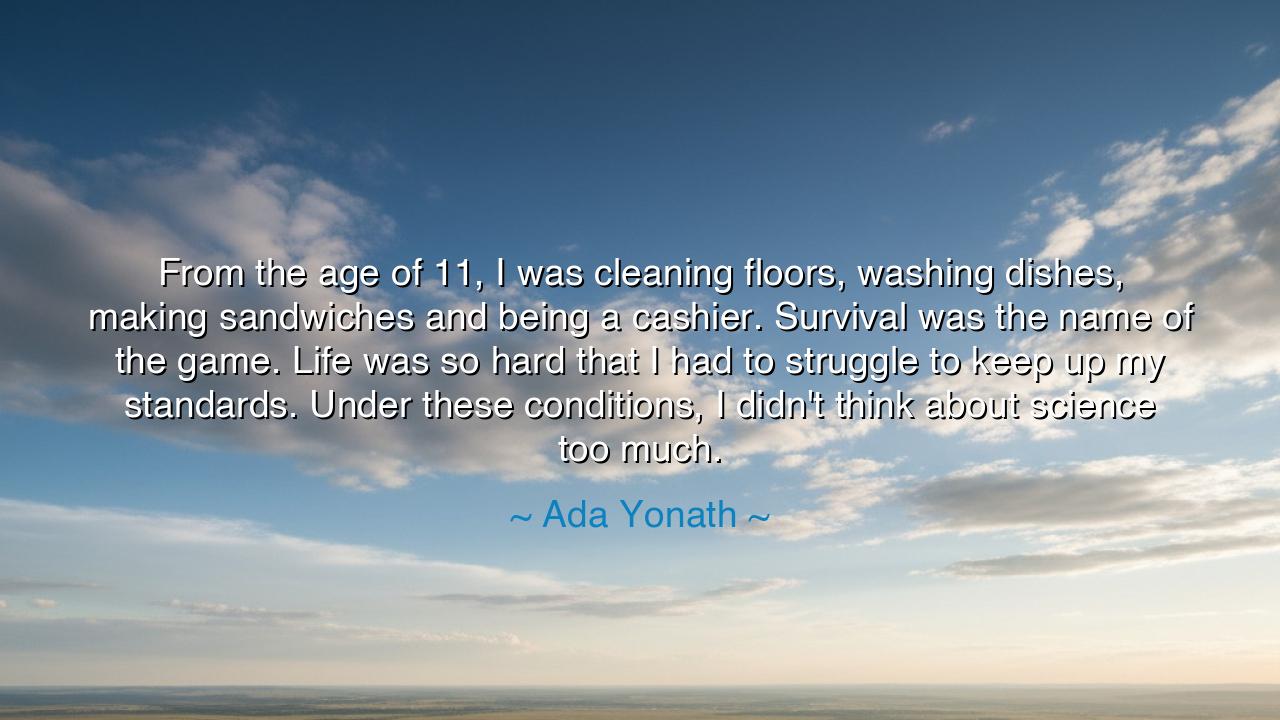
From the age of 11, I was cleaning floors, washing dishes, making
From the age of 11, I was cleaning floors, washing dishes, making sandwiches and being a cashier. Survival was the name of the game. Life was so hard that I had to struggle to keep up my standards. Under these conditions, I didn't think about science too much.






"From the age of 11, I was cleaning floors, washing dishes, making sandwiches and being a cashier. Survival was the name of the game. Life was so hard that I had to struggle to keep up my standards. Under these conditions, I didn't think about science too much." – Ada Yonath
In the tapestry of human experience, there are many threads of struggle and perseverance, and the tale of Ada Yonath offers us a glimpse into the realities of a life marked by hardship and the desperate need for survival. Yonath’s words carry the weight of a truth that transcends generations—that when faced with the necessity to survive, one’s aspirations and dreams often fall into the background. From a tender age, she found herself immersed in the laborious work of cleaning floors, washing dishes, and making sandwiches, tasks that consumed her time and energy. The survival instinct, as she so powerfully captures, becomes all-encompassing; the weight of these daily struggles can often overshadow even the loftiest dreams, like those of science and discovery.
This struggle for survival is a theme echoed in ancient stories of perseverance. The Greek hero Heracles, for example, was known for his strength and his labor, yet his trials were not simply feats of physical endurance—they were symbolic of the human condition. Each task he faced, from the Twelve Labors to the challenges posed by the gods, was an arduous journey of overcoming obstacles that at times seemed insurmountable. Similarly, Yonath’s early life was not a simple one; it was a labyrinth of survival, where the basic needs of life took precedence over higher intellectual pursuits. It was a battle not for glory but for sustenance, and it shaped her in ways that would echo throughout her life.
Yet, as Yonath’s story reveals, survival is not the end of the journey but the beginning of it. Though the harshness of life initially overshadowed her thoughts of science, this very struggle would come to fuel her resilience and her drive. For, just as the philosophers of ancient times were often forged in the crucible of hardship, so too was Yonath’s eventual success in science shaped by the strength she developed during her early years of labor. Socrates, though born into poverty, became one of the greatest thinkers of his time, precisely because his experiences forced him to question and reflect on the nature of existence, justice, and knowledge. Yonath, too, would one day rise above the immediate struggles of survival to make contributions to the world of science that would change the course of history.
This story is also a reminder that education, like wisdom, often requires a struggle to obtain. In ancient societies, the pursuit of knowledge was often not an easy path. The great thinkers—from Aristotle to Galileo—often faced resistance, whether from society, from political structures, or from the limitations of their own circumstances. They did not live in a world of easy access to learning; instead, they fought for every piece of wisdom they attained. Yonath’s struggle mirrors this ancient truth: that great achievements often arise from adversity. The challenges she faced as a young girl—working hard to sustain herself and her family—became the foundation upon which her scientific breakthroughs were built. Her ability to survive in such harsh conditions sharpened her resolve, just as the challenges faced by the ancient philosophers refined their understanding of the world.
The lesson here is clear: survival may momentarily eclipse other aspirations, but it is not the end of the story. The strength that one gains from facing hardship, from persevering in the face of adversity, becomes the fuel for future triumphs. Yonath’s life is a testament to the power of resilience, and it teaches us that while the road may be difficult, it is not the struggles we face, but the determination to rise above them that defines us. Just as Yonath found her path to greatness in the world of science, so too can we find our own paths to fulfillment and purpose, no matter the challenges before us.
Moreover, the story of Yonath reminds us that nothing is wasted in the journey of life. Every experience, every difficulty, every moment spent fighting for survival can be transformed into something of value. Marcus Aurelius, the Roman emperor and Stoic philosopher, taught that hardship is not something to be feared but something that prepares us for greater challenges. The struggles of youth can provide the foundation for wisdom in adulthood. The same is true for Yonath. What seemed like a burden during her youth—working to support herself—became a source of strength as she later became a pioneering scientist, contributing to the understanding of the molecular structure of ribosomes.
In practical terms, the lesson we must take from Yonath’s words is one of resilience, adaptability, and purpose. Life may not always unfold as we expect, and the challenges we face may seem overwhelming, but it is through these struggles that our true strength is formed. Just as Yonath persevered and eventually achieved greatness in science, so can we find ways to turn our own struggles into stepping stones toward a future filled with possibility. Let us take strength from her story, knowing that difficult circumstances do not define our fate—they merely shape our ability to rise and transform.






AAdministratorAdministrator
Welcome, honored guests. Please leave a comment, we will respond soon